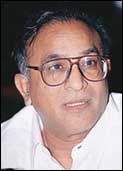Home > Business > Special
Reddy to take centre-stage
Bipin Chandran |
August 23, 2004

When Jaipal Reddy took charge of the information and broadcasting ministry about three months ago, many saw it as a move to park the fiery Andhra politician in a ministry in which he would have little to do.
After all, in the last one year of the Vajpayee government, Reddy's predecessor Ravi Shankar Prasad had given away most powers of the information and broadcasting ministry to the Telecom Regulatory Authority of India.
These included, powers to draw up regulations for the controversial conditional-access system, FM radio as well as direct-to-home.
Political observers says Prasad did this because he was keen to avert a crisis like CAS, which saw broadcasting companies and cable operators openly defying the government's rules and powers.
But from his very first day in office, Reddy has made it clear that he has no intention of lying low. When it came to light that M J Akbar and T Venkat Ram Reddy were publishing the International Herald Tribune from Hyderabad, he swung into action, demanding that the publication be stopped immediately.
While the National Democratic Alliance government was ambivalent about private broadcasters sharing the feed of events of national importance with the state-run Doordarshan, Reddy has taken the hard line that the broadcasters do not have a choice.
In the last few days, Reddy has really gone on the offensive: he first turned down the Trai recommendations on the private FM radio sector and then announced that his ministry would review the norms for DTH services. It is worth noting that Reddy had banned DTH as information and broadcasting minister in 1997.
Reddy's reasoning for rejecting the revenue share proposal for FM radio service providers was clear. If he accepts the recommendations, the government's revenue will dip from the present Rs 120 crore (Rs 1.2 billion) to under Rs 10 crore (Rs 100 million).
Besides, the government does not have the machinery to collect the real dues. More important, by rejecting the Trai recommendations on FM radio, Reddy has regained the power to frame rules to regulate the sector.
Reddy is a seasoned politician. The 62-year-old journalism graduate from Osmania University in Hyderabad started his political career in his early twenties, when he became president of the Andhra Pradesh Youth Congress.
Reddy was elected to the Andhra Pradesh Assembly in 1969 and was elected to the Lok Sabha in 1984. In his 20-year long stint as a Parliamentarian, he was twice elected to the Rajya Sabha, in 1990 and 1997, and three times to the Lok Sabha member (in 1984, 1998 and 2004).
Reddy is now working on the fine print of a policy that will take away the powers of Trai to regulate the broadcasting sector. "We require a policy covering various aspects of broadcasting. At present, regulations on this sector are fragmented with most sectors being governed by guidelines instead of laws passed by the Parliament," Reddy points out.
The immediate acid test for Reddy will be how he handles the DTH sector. The government has approved Subhash Chandra's ASC Enterprises to start a DTH service, but the company is now being accused of airing pornographic content. A public interest litigation is being heard at the Delhi high court on the issue.
On the other hand, Space TV, the joint venture between Rupert Murdoch's Star and Tata Sons, is awaiting government approval to start its DTH services. But the government is not ready to give the company clearance to operate until it is ready to share its content with other DTH platform providers.
But if the rumours in the capital's broadcasting circles are to be believed, Star Group chief executive Michelle Guthrie met Congress President Sonia Gandhi last week to explain the company's position.
Will Reddy buckle under pressure? Those who know him well say the chances are next to zero.